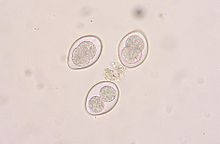User:Erunneberg21/Coccidia
| This is the sandbox page where you will draft your initial Wikipedia contribution.
If you're starting a new article, you can develop it here until it's ready to go live. If you're working on improvements to an existing article, copy only one section at a time of the article to this sandbox to work on, and be sure to use an edit summary linking to the article you copied from. Do not copy over the entire article. You can find additional instructions here. Remember to save your work regularly using the "Publish page" button. (It just means 'save'; it will still be in the sandbox.) You can add bold formatting to your additions to differentiate them from existing content. |
Article Draft
[edit]Lead
[edit]Depending on the species of coccidia, infection can cause fever, vomiting, diarrhea, muscle pain, and nervous system effects and changes to behavior, and may lead to death. Healthy adults may recover without medication—but those who are immunocompromised or young almost certainly require medication to prevent death. Humans generally become infected by eating under-cooked meat, but can contract infection with T. gondii by poor hygiene when handling cat waste.
(Needs a citation added).
Article body
[edit]Infected animals spread spores called oocysts in their stool. The oocysts mature, called sporulation. When another animal passes over the location where the feces were deposited, it may pick up the spores, which it then ingests when grooming itself.
Infection of Coccidia in species of sheep[1]

As the infection continues, millions of intestinal cells may become infected. As they break open, they produce a bloody, watery diarrhea. This can cause dehydration, and can lead to death in young or small pets.
Coccidia infections display symptoms mainly from the digestive tract including diarrhea, inflammation, intestinal pain or damage, vomiting, and irregular nutrition. These can lead to weight loss or reduced growth development, anemia, exhaustion, and even death in severe cases.[1]
References
[edit]References
[edit]- ^ a b Yan, Xiaofei; Liu, Mingjun; He, Sangang; Tong, Ting; Liu, Yiyong; Ding, Keqi; Deng, Haifeng; Wang, Peiming (2021-05-19). Clegg, Simon (ed.). "An epidemiological study of gastrointestinal nematode and Eimeria coccidia infections in different populations of Kazakh sheep". PLOS ONE. 16 (5): e0251307. doi:10.1371/journal.pone.0251307. ISSN 1932-6203. PMC 8133398. PMID 34010315.
{{cite journal}}: CS1 maint: PMC format (link) CS1 maint: unflagged free DOI (link)
